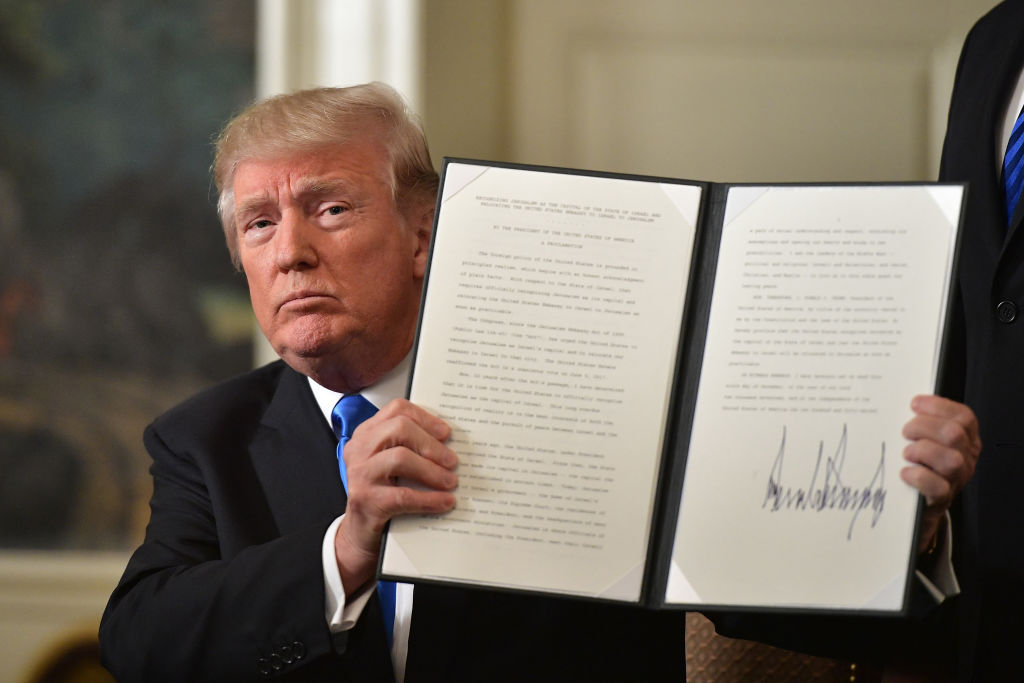The wailing and gnashing of teeth over Donald Trump’s decision to recognise Jerusalem as Israel’s capital continues, but the President’s critics are missing a more important part of his statement. For one of the first-times since he made it to the White House, Trump has now seriously resurrected the ‘two-state solution’ as an option. For Israel’s staunchest defenders and some elements on the American right, Trump’s silence on Palestine had been interpreted as proof that the idea of a Palestinian state was dead and buried. But now, by talking up the two-state solution once again, Trump seems to have confirmed that this isn’t the case: the ‘ultimate deal’ to bring peace to the Middle East that Trump promised could be back on.
Understandably, not everyone is happy at the re-emergence of the two state solution. Some leading hardliners in the Israeli government have expressed their disappointment at Trump’s statement. And Trump’s request that the country maintain the status quo on the Temple Mount, where the Israeli government currently prevents Jews from praying at their holiest site, underlines the impression that little will change as a result of his declaration.
Even the president’s decision to relocate the US embassy has been called into question. After his dramatic announcement, Trump signed a six-month waiver delaying the decision. When, or if, the US government decides to follow through on the decision, it is likely to take years – by which point Trump’s time in the White House could be up. So what was the point in Trump’s announcement? Having succeeded in angering his critics, it’s possible that this is already a partial fulfilment of the president’s plan. But once the ‘days of rage’ and fury passes, Trump’s decision might succeed in doing more than just trolling his enemies. It could also turn out to have desirable – and unintended – consequences on the mindset of Palestinian and Israeli leaders alike in forging the path to a much-needed solution to an age-old problem.
Over the last two decades, the Palestinian leadership has rejected peace proposals by dovish Israeli leaders such as Ehud Barak and Ehud Olmert, and declined to make counter-offers when presented with such proposals. Mahmoud Abbas refused to negotiate for almost the entire duration of Barak Obama’s presidency, believing that Obama would ‘deliver’ the Israelis and force the country into concessions. When this failed to transpire, Abbas took the unilateral route and applied for recognition in 15 international bodies, blowing up the negotiations that John Kerry had finally managed to initiate. Trump’s decision to grant recognition to Jerusalem as Israel’s capital could well serve as a warning to the Palestinian leadership to abandon its rejectionist stance, and demonstrate that the volatile, erratic and unpredictable US leader could exact retribution against them if they fail to respond appropriately to Jared Kushner’s coming proposal.
Trump may also be binding the hands of the Israelis to block any future peace deal. By burnishing his Israel-friendly credentials through his Jerusalem declaration, Trump is making it difficult for Netanyahu to decline negotiations and not offer up concessions. Bayit Yehudi and the hard-right wing of the Likud party, constituting its majority these days, will simply have to grin and bear the coming peace plan in the knowledge that Trump may well get impatient with Israel too, after his generous gift. And if the government is toppled, they cannot be confident that a new right-wing coalition will emerge, given the continuing rise in the polls of Yair Lapid’s centrist Yesh Atid party and the heavy shadow of criminal corruption investigations hanging over Netanyahu’s head. Trump said, quite pointedly, that failed, old assumptions and strategies of the past should be re-evaluated. It is possible that in the context of the Israel-Palestinian conflict, he is not entirely wrong.
Jeremy Sharon is the religious affairs correspondent for the Jerusalem Post





Comments